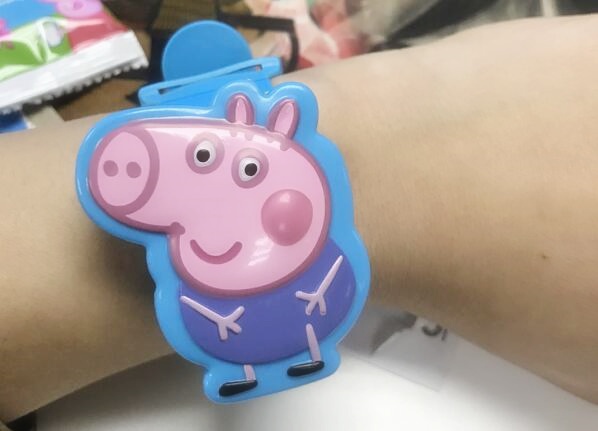Gold panning for film derivatives: from blank to mature development industry

Special feature of 1905 film network Recently, when it comes to derivatives, the first thing that comes to Xiao Dianjun’s mind is "Piggy Peggy puts it on his hand and applauds people in society".

What is your favorite movie derivative? Is it dozens of Mickey Keychains or thousands of precious luke skywalker lightsabers?

As early as a few years ago, when people in the film industry talked about derivatives, they always took Disney as an example, shaking their heads and frowning and feeling the blank in the domestic market. The reasons were nothing more than the lack of buying habits of the audience, the lack of excellent film images suitable for developing derivatives, the lack of attention paid by the film side to the commercial value of the post-product itself, and the lack of formal sales channels & HELIP; …
In recent years, the film market has experienced an upgrade from quantity to quality. China Film, Wanda, Huayi, Ali and other big companies have set up derivatives business sectors, and film and television colleges have set up derivatives design majors, and the industry has gradually subdivided from IP authorization management, design suppliers to online and offline sales.
More intuitively, the domestic film derivatives within the audience’s reach have gradually developed from cheap and stereotyped desk calendars, mobile phone cases, playing cards and cushions to diversified derivative authorized products covering food, clothing, jewelry, digital products and electrical appliances.

The market of film derivatives has been almost blank to take shape in a few years, and its development is obvious to all. However, compared with the movie box office, which ranks second in the world all year round and ranks first in the world in a single month, it seems that there is still a long way to go for the gold rush of derivatives.
According to Lima’s "2017 Global Licensing Market Survey Report", in the past year, the pan-entertainment derivatives and licensing income in the United States reached 897 billion, while that in China was only 48.8 billion. The contrast of another set of data is even more obvious. The per capita consumption of derivatives in the United States was 2,600 yuan, while that in China was 33 yuan. Even though film companies have begun to lay out according to the derivative development system of Hollywood industrialization, the industry is still facing many brand-new challenges in the process of maturity.
From almost blank to beginning to take shape
The development of domestic film derivatives is still in the exploratory stage.
Since 2015, major film companies have begun to have trends about derivatives. First, China Film and Warner Bros. held a letter of intent signing ceremony for film derivatives projects in Beijing, announcing a pilot plan for strategic retail and authorized commodity sales;

Subsequently, the WeChat movie ticket also announced that it would cooperate with Disney e-commerce brand station to launch genuine peripheral products;
In 2016, Wanda formally established derivatives related departments, and some domestic derivatives companies also began to develop derivatives of domestic films … …

In recent years, we have indeed seen some good cases of derivative development: in 2015, after the domestic animation made a box office of more than 900 million yuan, its total sales of derivatives also exceeded 300 million yuan;

Before the release of this year’s Spring Festival file, it has established the authorization for joint marketing cooperation with nearly 60 brands such as McDonald’s and Master Kong, and the authorization fee alone has reached tens of millions;

During the same period, a variety of derivatives were also launched, among which razors sold more than 400,000 in less than one month, and their detective notes broke more than 1 million in less than one month on Modian.com, creating an industry record.
However, we must also admit that "explosions" are always in the minority, and our derivatives market is still in the exploratory stage. The income from derivatives in the United States is as high as 70% of the total movie revenue, far exceeding the box office by more than twice, while the income from derivatives in China is "less than nine Niu Yi cents".
Although the argument that "the derivatives market has great potential" has been sung by experts again and again, most of the derivatives in the window of cinemas still exist symbolically. For cinemas, the profits around these films are far less than water and popcorn.
As for the reasons, I’m afraid it’s still those "platitudes": the audience’s lack of buying habits, the lack of excellent film images suitable for developing derivatives, the film side’s low attention to the commercial value of the post-product itself, and the widespread piracy but lack of formal sales channels.
For the big environment of derivatives, Wang Daning, general manager of New Art Association Company, basically attributed the problem to the quality of films. He once compared: "Now many factories are polluting the environment, and so are many films, which are shoddy and shoddy. They will not consider any long-term problems and make quick money. "

Sun Haoxuan, the authorized director of Wanda Film and Television, believes that the industry relies too much on the box office when it comes to film projects. "Everyone will spend a lot of time on making a film project, and the focus is actually on the film, so this piece in the production process is vacant, but because the box office is unpredictable, for example, its box office revenue is not particularly good, but our derivative sales are particularly good."
The product standard system needs to be established and the marketing environment is insufficient …
On the Development of Derivative Industries
As a new format of the mainland film industry, derivatives have emerged with the rapid development of China’s film industry. More and more enterprises and brands have joined the licensing, design, research and development, production and sales of film and television derivative industries.
According to NI Yuehong, a professor at Beijing Film Academy, film derivatives are not ordinary commodities, but licensed commodities (the core of licensed commodity management is the authorized use of intellectual property rights, and the franchisee operates in a unified mode and pays fees to the franchisor), which leads to a more complicated process in product design, development, production and sales than ordinary commodities, and many small-scale and single-business enterprises are difficult to adapt to the special needs of such product development.

For the problems existing in the development of China’s derivative industries, Nie Yuehong believes that the first is that the product standard system has not been established. "Quality control depends on standards. Hollywood products have strict quality standards, and any factory in the world can produce products with the same standards, but we have not done this yet."
Secondly, the absence of source management is also a cause that cannot be ignored. Original design is the source of film derivative development. IP authorization should not be a blank check, but should authorize the production of products on the basis of design results.
Compared with the emphasis on the investigation of pirated movies, the crackdown on piracy infringement in the industry is obviously not enough. Ni Yuehong said, "If we can protect the intellectual property rights of domestic movie derivatives like Olympic licensed goods, we will certainly be able to curb the occurrence of counterfeit goods."
In addition, the inadequate marketing environment is also an urgent problem for the derivatives industry. At present, there are three main channels for the sale of derivatives, namely cinema counters, direct-sale stores and e-commerce platforms.
Ni Yuehong believes that these three channels all lack the environment to experience movies, which also reduces consumers’ perception of the brand value and significance of movies.
For example, he said, "Most of Disney’s derivatives are sold through Disney theme parks all over the world. We have studios of a certain scale, such as Hengdian and Xiangshan, where a large number of film and television dramas are filmed, and visitors are in a constant stream. It is a unique sales environment, but there are no film and television derivatives, and all of them are local specialties. This is a huge waste of consumption resources for film and television derivatives. "
How to break the game?
Overseas experience cannot be directly copied, and it is very important to establish industrial cooperation.
How to divide the money earned from film derivatives?
An industry insider told us that at present, the business model of overseas film derivatives is mainly based on copyright sales, and the copyright split is also very detailed. In this model, 12% of the derivative income goes to the film side.
"For example, an Iron Man can be split into 100 copyrights. Even dolls with different heights and sizes will be sold to different manufacturers, as well as the division of sales areas. The same thing can be sold to different places."

In addition, the copyright can be bought out at one time, and the final sales of derivatives have nothing to do with the film company.
A few years ago, domestic derivatives were mainly based on resource replacement and sales sharing, and few people were willing to spend money on copyright. But now, after successful cases, more and more film makers have seen the commercial value of derivatives.
Sun Haoxuan said, "Film and television licensing is actually in its infancy. Everyone is exploring and learning from overseas to explore what kind of model we should use to develop derivatives that meet our own characteristics in China, because many things that are very European are not necessarily sold in China."
Sun Haoxuan is very optimistic about the prospects of the derivatives industry. "In fact, we know that this industry will definitely get better and better, but it can never be said that only a few companies are doing this. In fact, it is better for the industry to develop together."
Nie Yuehong also agreed with this. He suggested that the industry should cooperate with each other. "Film production enterprises can’t monopolize the business in all fields. It must be a chain of division of labor and cooperation. The most realistic way to develop China’s film derivative industry at this stage is to strengthen cooperation. Enterprises with different film creation, product development, production and sales cooperate with each other to get what they need and get what they want."